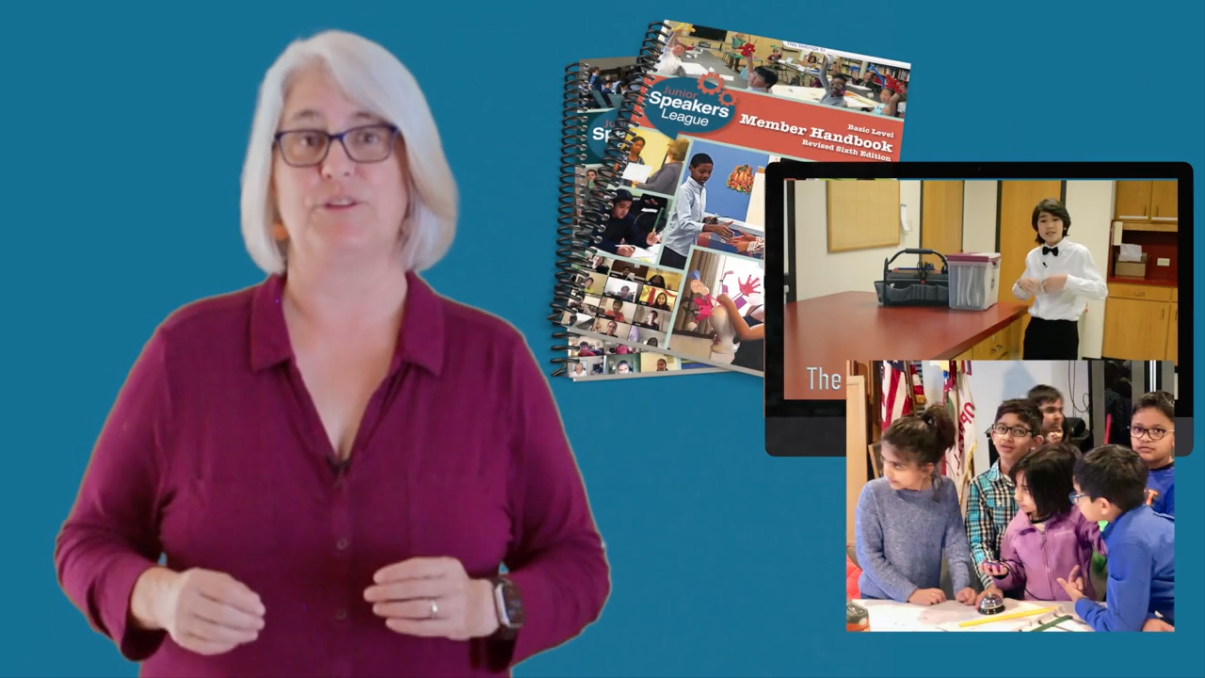Speakers League
Chairperson Training.
Here's where you will learn how to launch, run, and grow your own Speakers League club(s).
- 18 Lessons
- 128 Minutes
Insert a brief 1-2 paragraph description here summarizing what your students will get from taking this course. Think about where they’ll be ‘before and after’ taking this course. Paint a picture of where they’ll be after taking this course, what they’ll get out of it and what that will do for them.
Include your value proposition of your course and keep this description brief and straight to the point. You can include more info about the course further down on the page for those who want to find out more info.

It’s actually 35 pages of illustrated material, more detailed than this web page, to show you how to plan, promote, and launch your club, including:
What is included with your subscription
What is available for purchase
Why start a Speakers League club
What happens at a Speakers League club meeting
Your role as Chairperson
Club start-up checklist
Where to hold meetings
Financial considerations & membership dues
How many members and how often to meet
Promoting the club
The first meeting and beyond (including lesson plans)
Room set up and name cards
Typical meeting timing and supplies
Scheduling roles
The Chairperson’s typical tasks
Chairperson’s FAQs
The Operations Manual is actually comprised of 8 parts.
Part 1 – Getting Started
Part 2 – First Meeting and Beyond
Part 3 – Member Handbook Levels I-II
Part 4 – Member Handbook Levels III-IV
Part 5 – Forms, Etc.
Part 6 – Incorporating Club Officers
Part 7 – Workshop Manual
Part 8 – Workshop Participant Handbook
For each Speakers League club you operate (and if you wish to conduct workshops), you must possess a valid Speakers League club charter. A charter is a $95 annually renewable license that gives you the right to use the Speakers League materials for one club, and/or to conduct any number of Speakers League workshops during the time you hold a charter. You also agree to our terms and conditions.
A Speakers League Club is defined as a single group of students that meets on a regular ongoing basis and conducts Speakers League structured meetings. Workshops are defined as short-term trainings (usually 6-16 sessions) at which a new group of students typically enrolls for each workshop series.
This is a common question, so we made an entire section of our Operating Manual devoted to the first few meetings. We provide two pathways to launching your club.
One pathway provides step-by-step lesson plans modules that you can implement over 3-4 meetings that will give you and your members a gradual, fun, and stress free introduction to the roles at a club meeting, techniques for Impromptus, a plan for preparing their first speech, and a foundation in how to effectively (and constructively) evaluate another member’s speech.
The other pathway is to start with a full meeting. To do this, you will provide handbooks to members at least two weeks prior to the first meeting, have members review the meeting highlight video and protocol video, and pre-assign meeting roles, including speeches.
That’s fine. There’s a lot of flexibility in holding workshops around the times of year that work best for you. Some teachers opt to conduct workshops during summer break. Some people do weekend or after-school workshops.
Our workshops work well for anywhere from 6-16 sessions.
An ongoing club is more of a commitment of time, but can also have flexibility. For example, many clubs take the summer off. Others convene somewhat sporadically when holidays come around. You can adjust your schedule for your and your members’ particular needs.
No. A group of families can just come together to start a club or do a workshop. It is even up to you whether you charge dues at all, to cover your expenses.
On a side note, we do not assist with business start up. We merely license our materials for your use, subject to our terms and conditions.
Clubs and workshops can operate with as few as six participants, doubling up on roles. A “micro-schedule” is available for these smaller clubs/workshops.
Ideally, you will have 12-18 participants, making it easy to fill all the roles with little or no doubling of roles.
Clubs and workshops with more than 18 members can become challenging due to not having enough time for everyone to speak during the Impromptu segment of the meeting. (This can be managed somewhat by not having the MC and speakers answer Impromptu questions.)
You determine your club’s schedule. Some clubs meet weekly, some twice a month, some once a month. A membership level of 12-20 can thrive on once or twice a month. A larger membership can do well with weekly meetings. It’s a matter of being able to fill your schedule and give everyone enough opportunities to do the roles and give prepared speeches.
You will probably have the best results with kids aged 10-and-up, though serious-minded younger ones can have success, as well. We’ve seen them as young as six!
A Speakers League club is generally an ongoing group that meets regularly for a school year, or more.
A Speakers League workshop is a short term group that meets for between six and sixteen sessions. The attendees generally participate in only one workshop.
Workshops are a great option for introducing public speaking and meeting management skills to groups. Our workshop materials are perfect for as few as 6 sessions, and as many as 16. (After that, you would convert the group to a full Speakers League club to have access to more speech types.)
Some charter holders use workshops to recruit for their ongoing clubs. Others just run workshops and never start an ongoing club. It’s up to you!
Yes! Many clubs have used video conferencing for meetings. It’s a great way to reach a wider membership base. One of our headquarters clubs that met during the day for homeschoolers was able to accept a member from Germany for whom (at 7 hours ahead) it was an after school program.
Insert a description of 1-2 sentences quickly summarizing what this section of the course is about.
Insert a description of 1-2 sentences quickly summarizing what this section of the course is about.
Insert a description of 1-2 sentences quickly summarizing what this section of the course is about.
Insert a description of 1-2 sentences quickly summarizing what this section of the course is about.
Insert a description of 1-2 sentences quickly summarizing what this section of the course is about.
Insert a description of 1-2 sentences quickly summarizing what this section of the course is about.





Insert a 1-2 paragraph description here about yourself. It’s good to focus on your experience and why people should trust you as an expert on the topic they want to learn about. Don’t forget to also talk about how you (and your course) can help them and not only talk about yourself here.
Insert your answer to the question. Lorem ipsum dolor sit amet, consectetur adipiscing elit. Ut elit tellus, luctus nec ullamcorper mattis, pulvinar dapibus leo.
Insert your answer to the question. Lorem ipsum dolor sit amet, consectetur adipiscing elit. Ut elit tellus, luctus nec ullamcorper mattis, pulvinar dapibus leo.
Insert your answer to the question. Lorem ipsum dolor sit amet, consectetur adipiscing elit. Ut elit tellus, luctus nec ullamcorper mattis, pulvinar dapibus leo.
Insert your answer to the question. Lorem ipsum dolor sit amet, consectetur adipiscing elit. Ut elit tellus, luctus nec ullamcorper mattis, pulvinar dapibus leo.
Insert your answer to the question. Lorem ipsum dolor sit amet, consectetur adipiscing elit. Ut elit tellus, luctus nec ullamcorper mattis, pulvinar dapibus leo.
Insert your answer to the question. Lorem ipsum dolor sit amet, consectetur adipiscing elit. Ut elit tellus, luctus nec ullamcorper mattis, pulvinar dapibus leo.
Insert your answer to the question. Lorem ipsum dolor sit amet, consectetur adipiscing elit. Ut elit tellus, luctus nec ullamcorper mattis, pulvinar dapibus leo.
Insert your answer to the question. Lorem ipsum dolor sit amet, consectetur adipiscing elit. Ut elit tellus, luctus nec ullamcorper mattis, pulvinar dapibus leo.